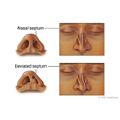Health Library
We have a vast digital library of medical information, including wellness and psychiatry topics as well as general medical topics. For more information or to schedule an appointment, don’t hesitate to call us.
Our Health Library information does not replace the advice of a doctor. Please be advised that this information is made available to assist our patients to learn more about their health. Our providers may not see and/or treat all topics found herein. Snoring is the sound you make during sleep when the flow of air from your mouth or nose to your lungs makes the tissues of your throat vibrate. This can make a loud, raspy noise. Sometimes people who snore also have sleep apnea. This means you stop breathing at times during sleep. When you sleep, the muscles in the back of the roof of your mouth (soft palate), tongue, and throat relax. If they relax too much, they narrow or block your airway. As you breathe, your soft palate and uvula vibrate and knock against the back of your throat, causing snoring. You may be able to treat snoring by making changes in your lifestyle and how you prepare for sleep. For example, you can try to lose weight if you're overweight, quit smoking or vaping, and sleep on your side. Or use a nasal strip over your nose to help you breathe while you sleep. When you sleep, the muscles in the back of the roof of your mouth (soft palate), tongue, and throat relax. If they relax too much, they narrow or block your airway. As you breathe, your soft palate and uvula vibrate and knock against the back of your throat. This causes the sounds you hear during snoring. The tonsils and adenoids may also vibrate. The narrower the airway is, the more the tissue vibrates, and the louder the snoring is. Snoring may be caused by: Other things that may contribute to snoring include drinking alcohol, obesity, and medicines that relax you or make you drowsy. Snoring can be soft or loud. If you have a bed partner, they may notice that you sleep with your mouth open or that you're restless while sleeping. If snoring keeps you or your bed partner from getting a good night's sleep, either or both of you may feel tired during the day. Call your doctor if you or your bed partner: Snoring is the main symptom of sleep apnea. This is a potentially serious sleep disorder in which you periodically stop breathing during sleep. Watchful waiting is a wait-and-see approach. It may be okay to try it if your snoring doesn't disturb your bed partner or if you aren't overly sleepy during the day. If home treatment doesn't help your snoring, contact your doctor. Watchful waiting may not be the right choice if you or your sleeping partner snores loudly and heavily, is restless during sleep, is sleepy during the day, or stops breathing when sleeping. These may point to sleep apnea. Contact your doctor. If you have a bed partner, they may notice that you snore or stop breathing at times during sleep. If you stop breathing during sleep, it can be a sign of sleep apnea. If your doctor thinks that you might have sleep apnea, you will be referred for a sleep study to find out. You may be able to treat snoring by making changes in your lifestyle and in the way you prepare for sleep. For example: If you snore and have sleep apnea, you may be able to use a machine that helps you breathe while you sleep. This treatment is called continuous positive airway pressure, or CPAP (say "SEE-pap"). In rare cases, surgery may be used to treat snoring. Snoring typically is first treated at home. Here are some things you can do. Current as of: October 27, 2024 Author: Ignite Healthwise, LLC Staff Current as of: October 27, 2024 Author: Ignite Healthwise, LLC Staff Clinical Review Board This information does not replace the advice of a doctor. Ignite Healthwise, LLC disclaims any warranty or liability for your use of this information. Your use of this information means that you agree to the Terms of Use and Privacy Policy. Learn how we develop our content. To learn more about Ignite Healthwise, LLC, visit webmdignite.com. © 2024-2025 Ignite Healthwise, LLC.Snoring
What is snoring?
What causes it?
How is snoring treated?
Cause
Symptoms
When to Call a Doctor
Watchful waiting
Exams and Tests
Learn more
Watch
Treatment Overview
Learn more
Watch
Self-Care
Learn more
Watch
Related Information
Credits
Clinical Review Board
All Ignite Healthwise, LLC education is reviewed by a team that includes physicians, nurses, advanced practitioners, registered dieticians, and other healthcare professionals.
All Ignite Healthwise, LLC education is reviewed by a team that includes physicians, nurses, advanced practitioners, registered dieticians, and other healthcare professionals.






